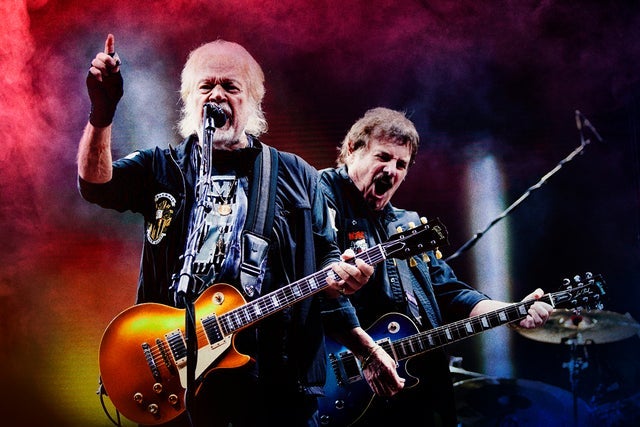Prairie origins, present-day chapter
Catalog that still bites
The band sprang from Winnipeg clubs, mixing garage grit with radio-ready pop and soul. Today it tours with original drummer Garry Peterson anchoring a newer cast, honoring songs first cut by
Burton Cummings and
Randy Bachman. Expect tight, bright takes on
American Woman,
These Eyes,
No Time, and
No Sugar Tonight / New Mother Nature. The crowd tends to span long-time fans, curious younger guitar nerds, and locals who grew up with classic rock radio. You might hear families singing the choruses, while pockets near the aisles lock into the grooves and harmonies. A neat nugget: the
American Woman riff came from an onstage jam during a broken-string pause in Kitchener in 1969. Another quirk: early pressings of
No Time differ from the hit single, with a longer, hazier guitar outro. Setlist and production details here are inferred from recent patterns and could shift by city or even by week.
Denim, choruses, and shared memory
What you notice in the crowd
Moments fans mark together
The scene skews relaxed and friendly, with denim jackets, vintage band tees, and a few prairie hats nodding to the group's Canadian roots. Couples and friends trade stories about first hearing
These Eyes, while younger fans film short clips of the big choruses. When
American Woman drops to the vamp, the front rows trade the call-and-response with a grin instead of a scream, like they know the script. The loudest communal sing may come on
Share the Land, where people instinctively layer harmonies on the last refrain. Merch tables favor classic fonts, a maple-leaf wink, and black tour tees you could wear to work without a fuss. Vinyl reissues and drumhead signatures get attention, but lyric prints also move because folks want a line for the wall. Between songs you will hear polite, specific requests rather than broad demands, a sign of fans who know the deep cuts. The whole night feels like a meet-up around songs that still do a job: steady grooves, clear hooks, and a little grit.
Riffs, harmonies, and the engine room
How the songs breathe live
Little choices with big impact
The current singer sits in a clear, bright tenor, and the band frames him with two and three-part harmonies that feel sturdy rather than flashy. Guitars lean on crisp rhythm chops with short echo, leaving space for bass to walk and for drums to punch the backbeat. Slow-burn tunes get trimmed intros, while the rockers often stretch with a mid-song break that lets the groove simmer. You may hear
These Eyes taken a half-step lower for warmth, with keys doubling the vocal line to thicken the chorus.
Undun often carries a light jazz lilt live, with the bass sliding between notes and the guitar adding hollow-body tones even when played on a solid-body. The band likes quick dynamic drops before final refrains, which turns familiar choruses into shared shout lines. Lighting follows the music, with cool blues on ballads and amber washes when the riffs crank, keeping focus on the playing. A small nerd note: the rhythm guitarist sometimes straps a capo at the second fret on parts of
No Time to keep open-chord chime while the lead handles the riffs.
Kinfolk of hooky rock radio
Neighboring sounds, shared fans
Why these shows feel related
Fans of
Burton Cummings will relate to the crooning ballads and the same melodic core that shaped the early records.
Bachman-Turner Overdrive appeals to those who like heavier riffs and a no-nonsense stomp, which overlaps with the bluesy edge in this set.
Three Dog Night draws a similar crowd that values big harmonies and radio classics sung loud. If you enjoy the sleek, arena-polished punch of
Styx, you will click with tight arrangements and stacked vocals here.
America is a fit for the acoustic shimmer and warm storytelling moments tucked between the rockers. Together these acts map a lane of 60s-70s songwriting where singable hooks meet sharp bands, and that is the lane this show cruises.



